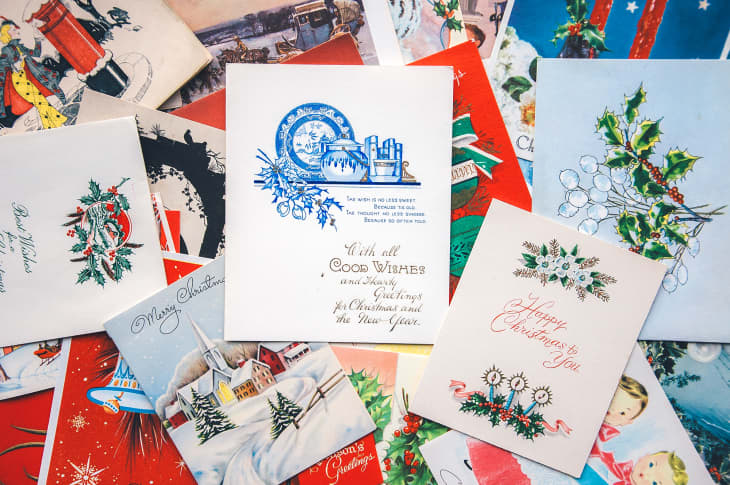One (Way Too Common) Mistake You Might Be Making with Your Holiday Cards

When it comes to holiday greeting cards, people generally stress over two things: finding the perfect photo and choosing a beautiful design. But I’m here to tell you that there’s one very important element you’re overlooking when sending holiday cards—your grammar.
That goes especially when it comes to pluralizing your family’s last name. I can’t tell you how many Christmas cards I’ve received with misplaced apostrophes. So many people get confused about how to pluralize last names, but it’s very simple. Whether you’re addressing envelopes or signing your own holiday card, the rules below hold. These rules are also relevant when personalizing gifts for a family or couple, or even ordering your annual ornament for a family tradition.
For most last names: Just add an “s”
Not “es;” not “ies;” and definitely no apostrophe. If your name ends in any letter except s, x, or z, you just add an “s.” (There are also certain exceptions for “ch” and “sh” names, more on that below.)
Here are some examples:
- the Earleys
- the Millers
- the Lanes
If your last name ends in s, x, z, or certain “ch” and “sh” sounds: Add an “es”
If your name ends in s, x, z, a soft ch, or sh, you just add an “es.” Not “ies;” not “s’;” just “es.”
Here are some examples:
- the Koviches
- the Diazes
- the Willamses
Though the Williamses sounds like a mouthful, it’s the correct way. If you’re looking for a way around it, try The Williams Family instead. Or, you could simply list your first names.
There is one exception to the “es” rule outlined above, and that’s if the “ch”or “sh” is hard, or makes a “k” sound. In that case, revert to rule number one and add just an “s.”
Here are some examples:
- the Harbachs
- the Von Achs
- the Lochs
One more thing…
Another common grammatical error on holiday greetings and personalized gifts has to do with capitalization. Though holidays like Christmas, Hanukkah, New Year’s Eve, and New Year’s Day are capitalized, the greetings associated with them are not.
Here are some examples:
“Merry Christmas from the Williamses”
Merry is capitalized, because it comes at the beginning of the sentence.
“We wish you a merry Christmas!”
Merry is not capitalized, because it does not come at the beginning of the sentence, and it is not part of the holiday’s name.
“Happy holidays from the Millers!”
Happy is capitalized, because it comes at the beginning of the sentence. Holidays is not capitalized, because it is not a proper noun.
When it comes to New Year’s Day and New Year’s Eve, there’s also a lot of confusion. The bottom line is if you’re referring to the holiday (even in abbreviated form, like “New Year’s”), it is capitalized; if you’re referring broadly to next year, it isn’t.
Here are some examples:
“Happy New Year from the Lochs!”
Happy is capitalized, because it comes at the beginning of the sentence. New Year is capitalized, because in this case, it’s a proper noun.
“We look forward to seeing you in the new year.”
New year is not capitalized, because it is not referring to the actual holiday.
Of course if all of this is overwhelming, there’s one surefire way to make sure your capitalization is correct: Go all-caps, like with this Artifact Uprising card, and call it a style choice.
Looking for other fun grammar facts? Check out these 20 garden path sentences or these cool words that will speak to your soul.